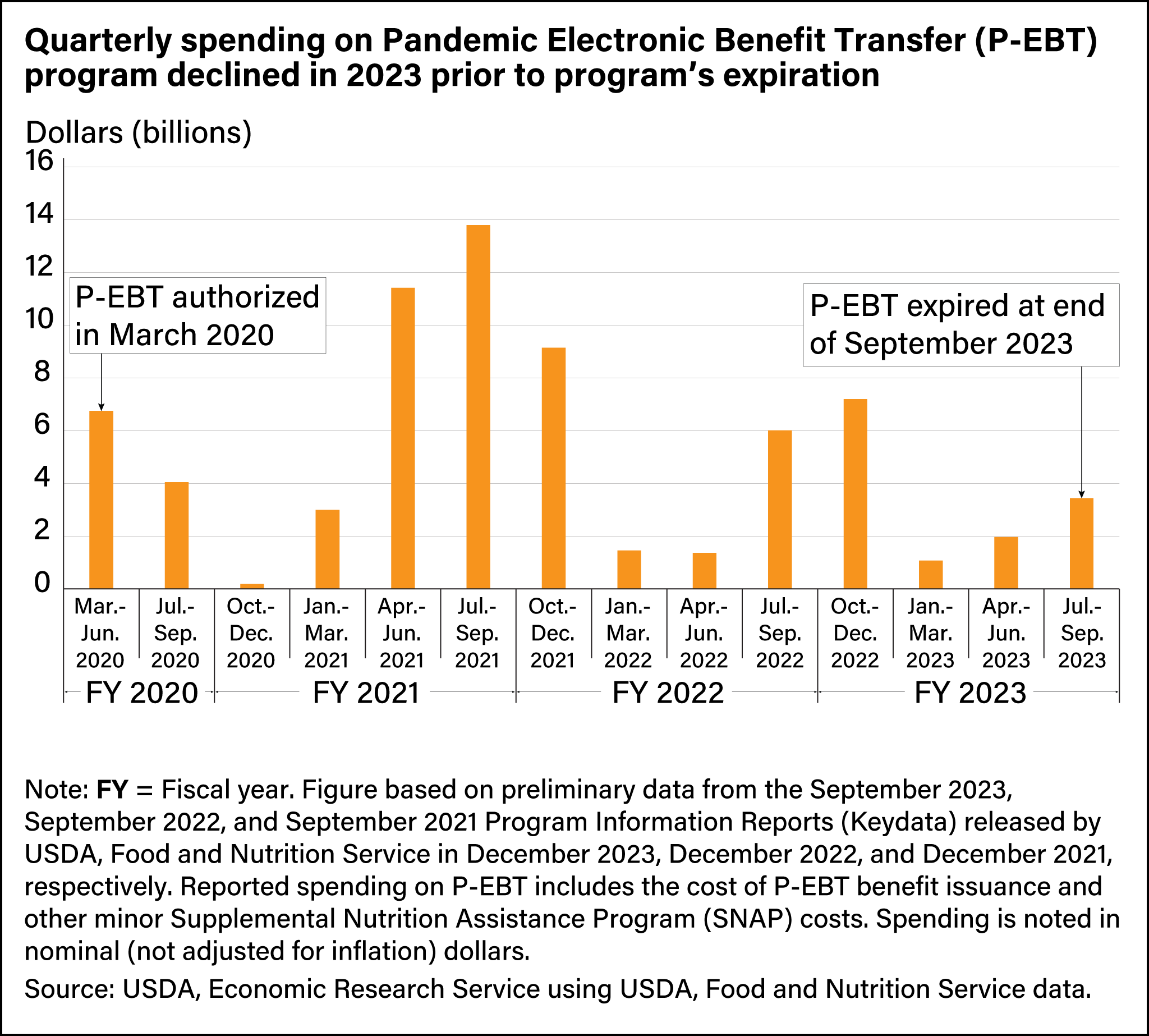
USDA’s Temporary Pandemic Electronic Benefit Transfer (P-EBT) Program Issued $70.9 Billion in Benefits From 2020 to 2023
- by Saied Toossi
- 6/24/2024
The Families First Coronavirus Response Act, passed in March 2020, authorized USDA to create the temporary Pandemic Electronic Benefit Transfer program (P-EBT) in response to Coronavirus (COVID-19) pandemic disruptions to the National School Lunch Program and School Breakfast Program. In typical years, on average, about 30 million children receive breakfast or lunch—often for free or at a reduced-price—through these programs each school day. As the pandemic forced the closure of schools, millions of children lost access to meals they otherwise would have received. The aim of the P-EBT program was to issue benefits to qualifying households with children in the 50 United States, Washington, DC, and U.S. territories for the value of school meals that were forgone because of pandemic-related disruptions to onsite instruction at schools.
States and territories wishing to participate in the program were required to develop a plan for identifying qualified households and how benefits would be distributed to them, and then submit these plans to USDA for approval. Depending on the State or territory, P-EBT benefits were issued retroactively in a lump sum or in multiple payments and varied depending on the number of days onsite instruction at schools was disrupted because of the pandemic.
Initially, P-EBT program eligibility was limited to households with school-aged children eligible for free or reduced-price school meals (those with incomes up to 185 percent of the Federal poverty line). Subsequent legislation increased the amount qualifying households received and expanded the program to include more children (such as some not yet enrolled in school) and to cover the summer months when most schools typically are closed for instruction. Legislation also extended the program’s operations through September 2023, and States were required to issue all retroactive benefits by the end of December 2023. From its inception in March 2020 through September 2023, the P-EBT program issued $70.9 billion in benefits. These benefits were distributed at different times, depending on pandemic-related disruptions and the timeliness of when States and territories were able to issue benefits.
The Consolidated Appropriations Act, 2023, passed in December 2022, replaced the P-EBT program with a new, permanent food and nutrition assistance program called the Summer Electronic Benefit Transfer Program for Children (Summer EBT). This program began operating in the summer of 2024 and provides qualifying households—those with school-aged children eligible for free and reduced-price school meals—with benefits that can be used to buy groceries during summer months when most schools are closed for instruction. Summer EBT benefits amount to $40 per child per month, or $120 per child for the entire summer. States interested in operating the program in summer 2024 were required to notify USDA. As of June 7, 2024, 45 States, territories, and Tribal nations had notified USDA of their intent to launch Summer EBT.
This article is drawn from:
- Jones, J.W. & Toossi, S. (2024). The Food and Nutrition Assistance Landscape: Fiscal Year 2023 Annual Report. U.S. Department of Agriculture, Economic Research Service. EIB-274.
You may also like:
- Toossi, S. (2023, September 20). One-Third of Households With Children Paying for School Meals Reported That Doing So Contributed to Financial Hardship. Amber Waves, U.S. Department of Agriculture, Economic Research Service.
- Toossi, S. (2024, June 13). State Universal Free School Meal Policies Reduced Food Insufficiency Among Children in the 2022–2023 School Year. Amber Waves, U.S. Department of Agriculture, Economic Research Service.
- Supplemental Nutrition Assistance Program (SNAP). (n.d.). U.S. Department of Agriculture, Economic Research Service.
- Food & Nutrition Assistance. (n.d.). U.S. Department of Agriculture, Economic Research Service.
- Child Nutrition Programs. (n.d.). U.S. Department of Agriculture, Economic Research Service.


